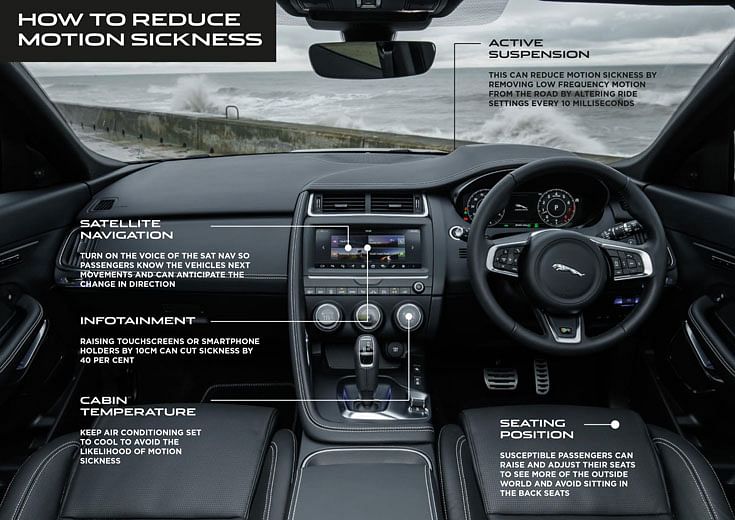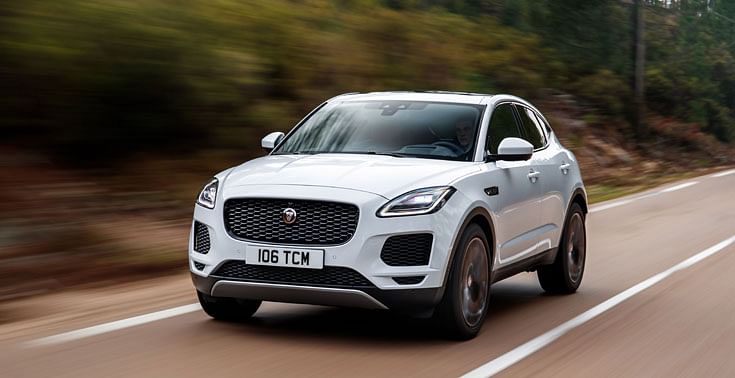Future Jaguar Land Rover vehicles to keep motion sickness at bay
Pioneering motion sickness research identifies techniques to reduce effects by at least 60 percent; vehicle dynamics and cabin settings will automatically adapt to individuals’ needs and prevent sickness
Future Jaguar Land Rover vehicles will be able to tell if you're feeling unwell and adjust settings to combat motion sickness.
Motion sickness affects over 70 percent of people. Spencer Salter, wellness technology researcher at Jaguar Land Rover, points out that previously "little has been known about the causes and how to mitigate them".
Generating a ‘wellness score’
Now, through its industry-leading motion sickness research, Jaguar Land Rover has created an algorithm that generates a ‘wellness score’ for each passenger. This can be used to automatically personalise a vehicle’s driving and cabin settings to reduce the effects of feeling car sick by up to 60 percent.
Jaguar Land Rover has already collected 15,000 miles of motion sickness data and tested the effects caused by performing a task while in transit, such as checking emails. This has enabled the creation of a baseline driving style for self-driving vehicles to work towards, minimising the need for steering corrections and therefore the risk of motion sickness while passengers work or relax.

Salter explains: “As we move towards an autonomous future where occupants will have more time to either work, read or relax on longer journeys, it's important we develop vehicles that can adapt to reduce the effects of motion sickness in a way that's tailored to each passenger.”
Motion sickness is often caused when the eyes observe information that is different from what is sensed by the inner ear, skin or body forces – commonly when reading.
The ‘wellness score’ calculates how susceptible individual drivers and passengers are to feeling car sick, using biometric sensors that record physiological signals. Combining this with motion and dynamics data, the vehicle will reliably know when a passenger or driver is becoming motion sick – before they do.
Dr. Steve Iley, Jaguar Land Rover Chief Medical Officer, explains: “This cutting-edge research has created a solution that, with its solid scientific foundation, can make travelling enjoyable, regardless of your susceptibility to motion sickness. As a parent of young children, who are most susceptible to car sickness, I am particularly excited by the benefits this research can have in making long journeys comfortable and stress-free for families.”

Jaguar or Land Rover vehicles today are already designed to help combat feelings of nausea. The Jaguar E-Pace, for example, has 26 different seat configurations for passengers to find a position that raises the infotainment screen relative to eye level as well as turn on the cooling seat function. Both factors have been proven to significantly reduce the likelihood of motion sickness. The E-pace’s Adaptive Dynamics also remove low frequency motion from the road, which can lead to nausea, by altering the ride settings every 10-milliseconds to ensure passengers always experience high levels of comfort.
The first phase of the research completes this month. The findings are already being implemented into further projects across research.
RELATED ARTICLES
Autoliv Plans JV for Advanced Safety Electronics With China’s HSAE
The new joint venture, which is to be located strategically near Shanghai and close to several existing Autoliv sites in...
JLR to Restart Production Over a Month After September Hacking
Manufacturing operations at the Tata Group-owned British luxury car and SUV manufacturer were shut down following a cybe...
BYD UK Sales Jump 880% in September to 11,271 units
Sales record sets the UK apart as the largest international market for BYD outside of China for the first time. The Seal...






 By Autocar Professional Bureau
By Autocar Professional Bureau
 01 Nov 2018
01 Nov 2018
 7342 Views
7342 Views





 Ajit Dalvi
Ajit Dalvi




